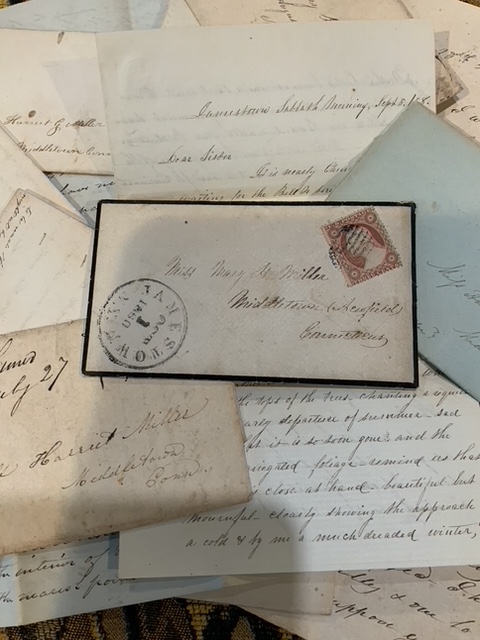by Walter W. Woodward
(c) Connecticut Explored Inc. Winter 2020-2021
Subscribe/Buy the Issue!
A private collection of family letters exchanged between Mary and Harriet Miller of Middlefield, Connecticut and female relatives and friends who emigrated west between 1820 and 1870 has given me profound appreciation for letters as communications binding women across time and space in early America.
American letter-writing first flourished in the 19th century, as Elizabeth Hewitt notes in The Edinburgh Companion to Nineteenth-Century American Letters and Letter Writing (Edinburgh University Press, 2016). Expanded public education, wide geographic mobility, a transportation revolution, and low postal rates gave millions of citizens the ability and incentive to use letters for what the 1843 magazine The New Englander called “a means of communication, or rather communion.” These written ties were vital in women’s efforts to maintain relationships and family connections. Letters became the extended arms of women seeking to maintain family bonds back to the old home and forward into their children’s future.
Letters to the Miller sisters reveal that leaving Connecticut often inflicted powerful and lingering pain of separation. “I can’t bear the thought of parting with you,” a friend wrote to Harriet in 1824. “The hills and mountains lie between us, yet may we not forget each other . . ..” wrote another. This longing for presence lasted many years. “How I wish I could sit a few hours with you and Mary,” “Auntie” Martha Tinker wrote decades after she moved to western New York. “Why must I be deprived of all those privileges?”
The letters also reveal the thrill of discovery, as women revel in the possibilities of their new locations. Perhaps trying to lure her cousin to join her, Martha Camp wrote Mary from Maysville, New York in 1829, “People here have come to the conclusion that Mrs. Camp is an excellent housekeeper and has been well brought up. … I have so raised the credit of Connecticut girls that if those who wish to get spliced [married]will come out, I think they will find Market pretty quick.” In a similar vein, cousin Mary Ann (last name unrecorded) announced from Yorkville, New York in 1839, “It’s true. I am married to one I love and who claims my first attention among friends of this world. Yet it is equally true,” she hastened to add, “that I have not forgotten old friends or ceased to love them.”
Connecticut remained a powerful emotional magnet. “Home. That endearing word.” Tinker wrote. “What trait more common than the attachment one feels for their native place.” Return visits were rare, though, and invitations to Connecticut relatives received few takers. “What a stay at home people the New England folks are,” noted Tinker. “I have spent nearly my whole life in this Country, and how seldom any of my relatives have visited me.”
Many of the migrant women watched and worried as more distant Western territories attracted husbands and children, stretching family ties farther. Tinker told her Connecticut family of her son Walter’s restless quest for the main chance, working as a clerk on a steamer on the Ohio River, then in Cincinnati and later St. Louis. One winter he returned to Jamestown, New York to work at the post office, “much to my comfort,” Tinker wrote. Two years later he was back in St. Louis. Tinker did not expect to see him that spring, but “will console myself if he remains where he is and not lengthen the distance.”
The most moving letter is the one Tinker sent to Mary in a black-bordered envelope in October 1860. “You have no doubt heard the sad tidings of Walter’s death,” she wrote. “I feel that my all is taken from me. He left Texas a few days before he died. He thought he was improving, but … had a relapse… . His resting place is in the land of strangers … Everything bright and beautiful of this earth lies buried.” Crushed by her loss, Tinker grieved with her Connecticut family in the one way open to her—by letter.
GO TO NEXT STORY
Read all of the State Historian’s columns on our BLOG

